It’s unusual to meet a runner who’s been running for over 40 years, and it’s particularly unusual for that runner to be a woman. The RunBritain rankings website lists 31,600 active runners aged 60 and over, but only 28% of them are women.
There has been a significant increase in women’s participation in distance running in the UK in the past ten years and this is reflected in much higher female participation levels in the younger age categories. Many of the active runners in the statistics are probably women who, like me, started running in their forties. There are far fewer women who have been running for thirty or forty years, compared to men.
Forty years ago, there were limited opportunities for women to participate in distance running. The women’s marathon did not make it on to the Olympic programme until 1984 and the 5000m and 10,000m were added much later. There were fewer opportunities to race, fewer medals to be won, and fewer role models.
I was delighted to be able to interview Maddy Collinge who started in running in 1977, aged 26, and has just turned 68. I was interested to find out how Maddy had got into running and how she has managed to keep running from her twenties to her sixties.
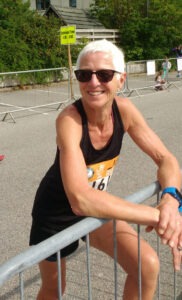
Maddy is a prolific and enthusiastic racer and competed in over 30 races in 2017, finishing first in her age category (V65) in the majority of them. She also finds time every week to coach and support other runners and has been involved in setting up local parkruns.
Maddy has achieved dozens of UK rankings in the top 50 for her age category from 2004 to 2018 at distances from 5k through to the marathon. She ranked 14th V65 woman in the UK for the half marathon in 2017.
I interviewed Maddy at her home in Newstead, Nottinghamshire on 20th April 2018, and also met her husband, Peter.
When did you start running?
In 1977. I was living in Munster in Germany and working for the military in a child guidance clinic. I had a British boyfriend who said I had put on weight. I can remember running in my wellies somewhere and I thought “Oh, I can do this.” I lived in a building that had a cobbled courtyard. I must have got myself some trainers and just run round the cobbles.
Then, I went to West Berlin for Easter in 1977, and met Peter. He was working in a hostel run by an organisation called Toc H for military people to stay in. I’d booked a room for the Easter weekend and he was on duty when I went up there.
Peter was quite interested in running but hadn’t started and I had just begun so we pottered around together. Then we never stopped really. That was 41 years ago, we just carried on running.
Peter moved down to where I was living, and we found a flat in a village outside Munster.
We found a group of men that were running on a Saturday morning, so we started to run with them in the woods. I suppose that’s where our love of off-road running came from. I was the only woman. I don’t think it ever occurred to me that I was the only woman. We just went along, and it was really nice.
We always did a lot, we cycled all the time as well. I started to run before I went to work. I actually ran into a lamppost one morning when it was dark, and I wasn’t concentrating. I split my head open and had to have some stitches, but that just taught me to watch where I was going really. It didn’t stop me running.
We stayed in Germany for another 4 years until 1981.
When you were in Germany did you enter any races?
Yes we did, but we can’t remember [what they were]. I think Germany was much keener on the outdoor sports. In the 70s they had these areas in the parks, called “Trimm-dichs” with different equipment and you could mess around with them. But here [in the UK] there was nothing. When we came home it was a real shock.
We did some 10ks, but we didn’t record our times. We just did it because we loved doing it. Everything is so different now.
When you were growing up did you do any sport?
My brother and I did a lot of swimming when we were young. No encouragement at all. I loved sport at school. I used to play netball and hockey but was never quite good enough to make the first team. But I was quite good in hockey because I could run. And I liked tennis as well. I was at a girls’ grammar school, so we had all that stuff. But nobody ever thought [that I had] any talent. I used to cycle to the park to meet my friends and play tennis. I enjoyed being outdoors.
As a family were you active?
No. We used to go for a walk on a Sunday afternoon. Very unadventurous.
Did you do sport after you left school?
No, I was a student for 4 years. I don’t think I did anything. So that’s how I ended up with this bloke telling me I’d put on weight. Before I went to Germany, I was doing a Masters degree in Leeds and I was also working in a pub. And you drink a bit. I don’t mean much, half a shandy maybe, but my weight probably went up to about 9 and a half stone. So, I began to carry more weight and he must have noticed, so that’s really what did it.
So, he launched your running career?
Yes he did, and he’ll never know. I’ve got a lot to thank him for really. I think he was called Trevor. He was an Army officer.
Where did you live when you came back to the UK in 1981?
We moved into a house in Bingham [near Nottingham]. We were running regularly by then and immediately discovered that the Robin Hood Half Marathon was happening. We found a group and I think we trained at the Rushcliffe Leisure Centre. We’ve got memories of running round and round the field. I don’t think we did anything interesting, but we just did it, because that’s what people did.
It was the first year that the Robin Hood Half Marathon happened. I got 1:44 something.
Was that the longest race that you’d done?
Yes, it was. We did 10ks in Germany. My 10k times in Germany were about 45, 46 [minutes] I think. But there was no structure, no training. We just ran for pleasure. So, I realise now I probably could have done more.
I did the Robin Hood Half and then my mind’s a blank after that. I was pregnant a lot from 83 to 91. I started having children in 1983 and had four and two miscarriages. I ran in between and during my pregnancies. When I was pregnant the first time, nobody did any running when they were pregnant. I hardly knew any women that ran. There was a chap who lives near here called John Whetton, who’s a former UK 1500m runner. He used to run a lot and I stopped him one day and asked him what he thought, and he said, “As long as you feel OK, carry on”. So, I did.
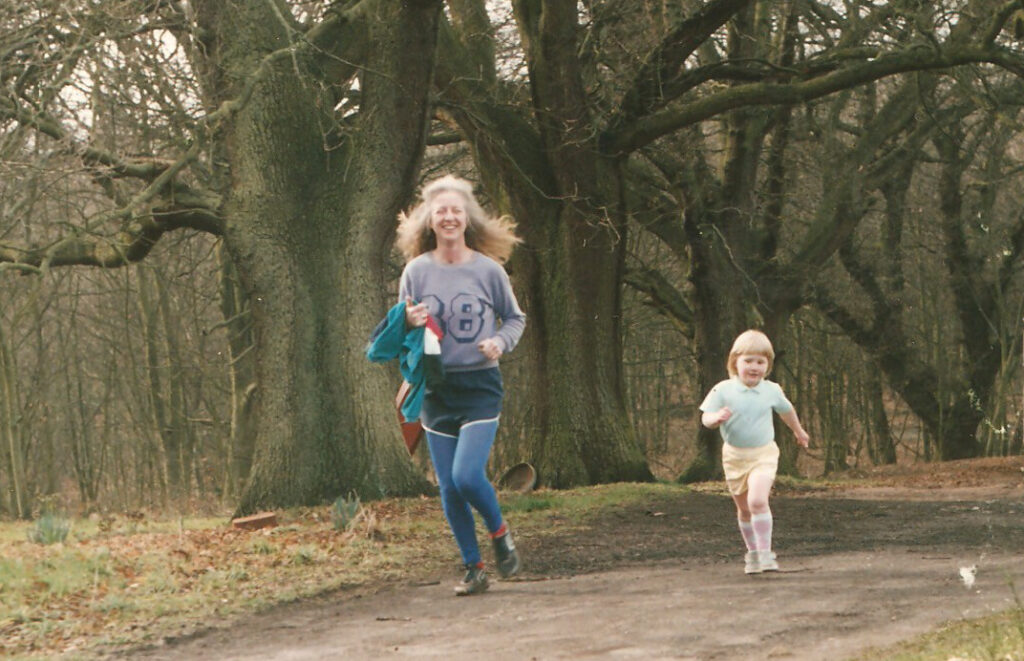
Maddy running with her daughter Daisy in 1990
With the last baby, Aiken, I ran right until the end, but I was only running a mile or two. With the others I probably stopped at about 7 or 8 months. I always say to women, “Just listen to how you feel, and if it doesn’t feel right then you stop”.
Did you join a running club?
In the 1980s Peter joined what became Mansfield Harriers but I didn’t because I worked full-time. Peter was at home. My priority when I’d finished work was to come home and be with the children. I was a social worker and then I qualified as a teacher. It was hard work for about 10 years. So, there was no way I could fit an athletics club into that. I just ran for pleasure and Peter used to run more seriously with the club.
I can’t remember when I joined the Harriers. It would be at least 20 years ago, probably 25, so that would be in the 1990s. After that I started to run more seriously in about 1997, 98. I’ve done every race you can imagine, plus a load that don’t exist any longer.
1999 was a significant date because you broke your ankle.
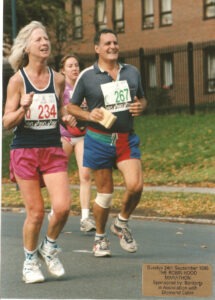
Maddy competing in 1995 Robin Hood Half Marathon
Yes. I was running really well with the club and getting some really good times. I was running not far from here off-road in my lunch break. I taught at West Notts [College] at the time. I climbed onto a stile and it snapped and there was this awful grinding of bones breaking. It was a horrific moment. I knew I’d done something really serious.
I had to hop to a house. Luckily the father of the woman who lived there was there and he took me back to work. I can’t remember much because I was in a lot of pain. I can just remember sitting in reception while they called an ambulance and then the ambulance crew gave me gas and air because it was horrible. They took me off to Kings Mill [hospital] and did some surgery and kept me in a night.
How long did it take to recover from breaking your ankle?
Well it was amazing. 6 weeks with a pot on, 6 weeks building up, then I was running again, after 3 months.
And does it affect you now?
No, not at all. There are pins and plates in my foot and ankle. People talk about the years it takes them [to recover] and I think I’ve been so lucky. I also think I’ve got quite a high pain threshold and I don’t feel things that perhaps other people might feel.
Then about three and a half years ago I fell on the ice a couple of times and began to get awful pain around my core. Anyway, to cut a long story short, I’d got pelvic stress fractures. That was a bit of a blow. I was 64 or 65 then. And then they found that I’d got osteoporosis and quite significant arthritis in both my hips.
The stress fractures healed, the osteoporosis is treatable, running is the obviously best thing to do. I take huge doses of calcium every day and once a week I take a bisphosphonate which is rather horrible, but it binds the bones.
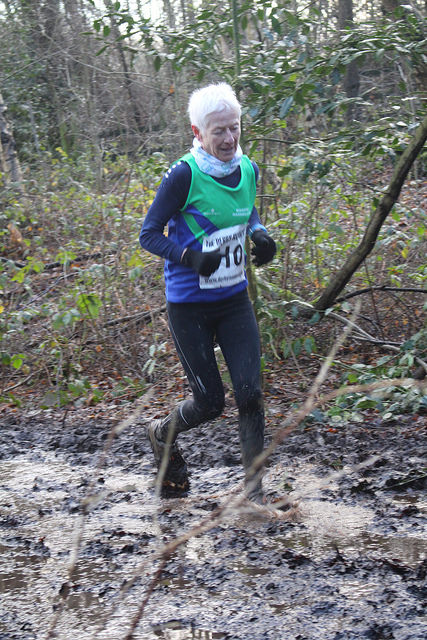
Competing in the Nottinghamshire County Cross Country Championships, January 2018 (photograph: John Oldfield)
I’ve been seeing a consultant at Queens [Medical Centre] who is part of Professor Batts’ sports medicine team. I got injured this winter in January, after doing the Folksworth 15 and having to pull out. That worried me because I’ve never ever dropped out of a race in all my years, and it really hurt. Glute, hamstring – I don’t know what it was really. The consultant did an x-ray and said it didn’t look like there were any more stress fractures but was it the right time now to talk about my hips? On Monday I’ve got to go and see a hip specialist at the City [hospital] where I think the conversation’s going to be about hip replacements which I don’t want really at all.
[I contacted Maddy after our interview to find out what had happened at this appointment. She has been told by the hip specialist that she does not need a hip replacement yet and can carry on running].
And you would have to take time to recover…
Yes, but there’s obviously only a finite window for me because in the last 3 months I’ve really slowed. I’m lucky if I can get under 2 hours for a half marathon now whereas 6 months ago it was 1:50 or 1:52.
Somewhere along the line my speed has gone so I’m curious to see whether it’s the hips that are slowing me down. But then if they do replace one of them that’s 3 months out and it would be difficult to imagine getting back to where I was.
The risk of arthritis is that you end up with bone on bone and then your hips aren’t any use at all, to anybody. I think I’m running on insufficient cartilage.
How important is performance to you?
Quite. Even at my age.
Do you think it would be difficult to adjust to running slower times?
Yes, but I’d have to. I coach a running group, Mansfield Runners. They’re all much younger than me and until recently I was probably faster than a lot of them but I’m not anymore. I really noticed a decline around 66, 67.
Have you and Peter carried on sharing your interest in running and going to races together?
Sort of. We don’t run together very much because he’s faster than me and we would argue. Originally, we did but not any more. We’d rather run separately but chat about it afterwards. I do what I like, and Peter does what he likes and occasionally we’ll meet in the middle.
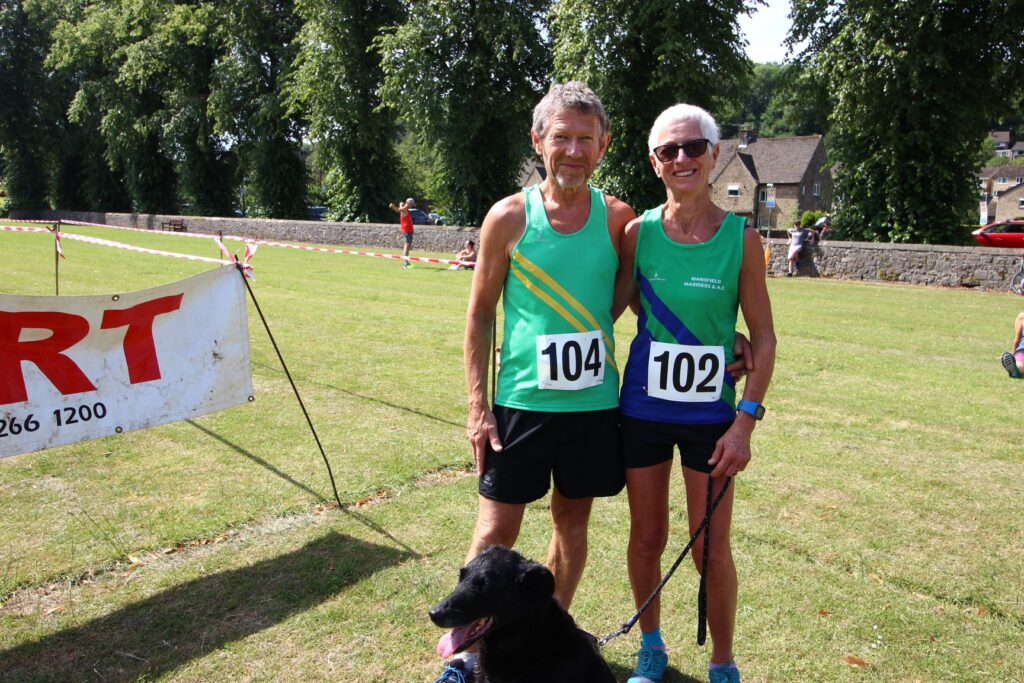
Peter and Maddy in July 2018
We also have a local running group that we manage called Ravenshead Running. That’s been up and running about 5 or 6 years now. We took it over from somebody who started it and then lost interest. It’s been great. We organize at least three runs a week and then there’s always stuff going on at weekends.
How long have you been coaching?
I set up Mansfield Runners in 2012 I think. Sue Bellingham helped me set it up. She died of cancer recently, which was really sad. I’ve got a lot to thank her for. We set it up when Run England were promoting beginners’ groups. It’s a RunTogether group now.
The Harriers was a bit fuddy duddy then. The club is a different place now. Since my group started we’ve also got a beginners group called Fit to Run Mansfield who feed through [to the club] and membership’s risen again. On a Thursday there’s Mansfield Runners, Fit to Run and the Harriers. A lot of my Mansfield Runners are now Harriers members too. Most of them join because they can see that we’re all having such fun.
I’ve also helped set up some parkruns over the years. I was there at the beginning of Mansfield parkrun. Then I helped set up the junior one in Hucknall and I still help there about once a month. I don’t do a lot of parkrunning, because on Saturdays there’s lots of other things to do.
And just this week I’ve been asked if I would help set up another local junior parkrun. I’ve got too much else to do, but I can find people who can do it so that’s what I’ve started to do this week.
I like the social media side. I know Facebook is a bit passé for young people, but it’s a way of communicating our message. I’ve got a public page for Mansfield Runners which has about 600 followers and is really popular. And we’ve got a closed social group that people have to ask to join and that’s where all the chat happens. Ravenshead Runners has also got a closed Facebook group.
What are the things you’re most proud of when it comes to performance?
I did my first London Marathon in 2001 when I was nearly 51. Now everybody wants to do marathons and they’ve only been running 6 months. It took me 25 years before I felt the urge to do one. I got a club place. I got 3.27 which I now think was quite good. I was 12th over 50 I do remember that. That was probably the best I ever got.
I’m proud that I got faster in 1999 after recovering from breaking my ankle.
[Maddy broke her ankle in March 1999. By July that year she was back to racing, and she set three half marathon personal best times, culminating in 1:34:21 at the Worksop Half Marathon in October where she was the 12th female finisher and first in her V45 age category. She was 49 at the time.]
I’m very proud of winning my age group lots of times.
Were there many women in the club in the 1990s?
There were. They weren’t competitive. We had a couple of young women who were good. There was nobody else. There weren’t many of me. I ran with the men for years. They used to lose me in the woods. I remember not knowing where I was sometimes because they’d all gone, and I couldn’t keep up with them. It made me work hard.
There wasn’t a culture of looking out for other runners?
No, if I lost a runner now I would be publicly shamed. It’s so different now.
Do you feel that there were some missed opportunities for you?
Oh, I’m sure there were. I wish I had had more encouragement, or coaching in the 90s. It’s sad really, isn’t it? I’m a bit shy at coming forward, although I sound very confident I suppose, I’m not very good at promoting myself.
Have you won a lot of county medals?
Yes. But sometimes there are only a couple of over-65s doing it. Sometimes it’s only me.
And does that not feel as good?
No, I like to feel I’ve had to work for it.
Have you done masters events?
As a club we do the British Masters Road Relays and cross-country relays but I can’t ever make up an over 65 team. There aren’t any other women. I’m going to Sutton Coldfield next Saturday and I’m in a v55 team which is a bit rotten because I’m 68.
I’m at the back these days. I get used to it. I keep saying, “I’m just glad I’m running”. Then I think, “No I’m not”. I want something else, a bit more competition.
Do you do other exercise?
I do spinning 3 times a week, that’s been my fallback from when I started to get injured. My friend introduced me to it 20 years ago, probably about same time as I broke my ankle. I carried on and whenever I’m really laid up I do it. I don’t like it much, but it does the job.
I do a bit of rowing before spinning and I do Pilates and body balance now. Good for my core I think. I do a lot of cycling, but I don’t race. You’re very aware as you get older that you need to maintain muscle tone, so I try to do very simple resistance stuff, press-ups and planks and I use little kettlebells.
How did the menopause affect you?
I feel like a real fraud. I can remember a couple of hot flushes. They were very odd. I feel guilty because every woman seems to suffer, don’t they? I had it at 50. It was gone in a year. I think I was very busy when I was 50 because our youngest child was only 8, and I was working full-time, so I probably didn’t notice a great deal about how I was.
Have there been people who’ve influenced and supported you in running?
Emmie, our younger daughter, has because she’s been so passionate about running. She ran as a little girl with us. Emmie has a really big talent and she’s run for GB a few times and won races. She came 2nd in the World Mountain Running Championship in 2015 and she won Gold at the European Mountain Running Championships (2016). She’s done really well. She lives in Italy now and she’s won some Italian championships.
Emmie will check my Strava and say, “I think you should do this, or I think you should do that.” That’s been really helpful. I’ve never had a proper coach.
All our children do something. They probably do more bike stuff now because Peter’s a very big cyclist and he likes building bikes and repairing bikes. They’ve all got such a love of exercise and sport. They’ve all been brought up here so that’s all they’ve known as children: the outdoors.
You have a partner who understands what you’re doing.
That’s probably pretty important. I have a lot of runners who I suspect have got somebody at home who’s on the grumpy side saying, “Where’s my dinner?”
We’ve never had a problem about running and we trust each other totally. I can do as I want, Peter will do as he wants. I think we’ve been very lucky. We run with our dogs as well. We’ve always had dogs.
We’ve had a fabulous 40 years of running. Sharing our running.
How would you say that things have changed in the time that you’ve been running?
The huge running boom has helped. It has given me my running groups and all my coaching, so I’ve got lots to thank people for, because if they weren’t all there then I wouldn’t be doing what I’m doing now. So that’s been really good.
And trying to inspire people a bit I suppose because I never got any encouragement myself. Hopefully women are getting much more support from their coaches than was my experience.
I’m always complaining about upper age group categories. I always check what the age categories are [for races] and if they stop at over 55 I write and say, “Have you thought about upping them?” and there’s a few that do.
There still aren’t many [older people running]. It quite often happens that I’m the only over 65 at a race.
How do you feel that running has benefitted you?
Immeasurably. Peter and I have lots of young friends and that’s remarkable. How lucky we are. When you give up paid work, your world can suddenly shrink to the Ramblers and shopping, but we’ve always got people to run with who are 20, 30 years younger than us and it’s so nice.
I think it’s kept us young as well. Apart from the osteoporosis, we’re pretty fit, aren’t we?
It’s been 40 years and there have been lean times and busy times. I’m just amazed at how quickly I recovered from my broken ankle. Wow, those times by the end of that year.
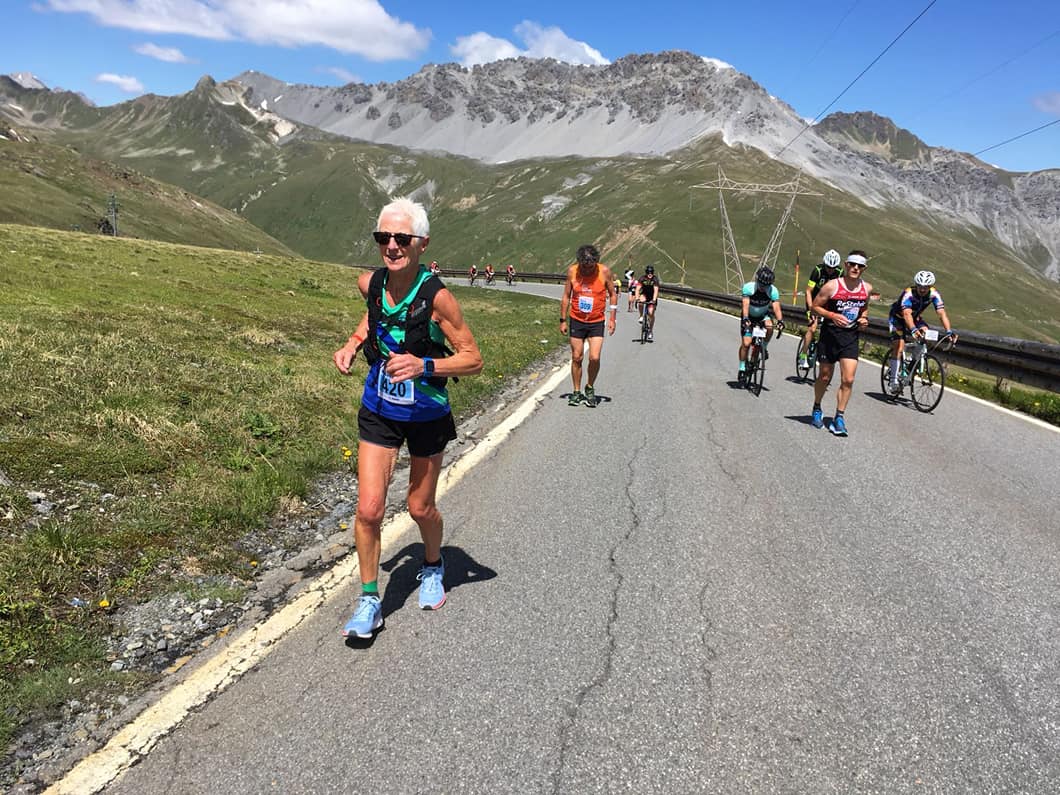
Maddy competing in the Stelvio Pass Uphill Half Marathon in Northern Italy, July 2018
…………………………………………………………………………….
Thank you Maddy for sharing your story with me.
View Maddy’s profile on The Power of 10 (British Athletics website)
Read my other interviews with female runners over 50:
Sandy Poole, February 2016 (v70)
Karen Parkin, March 2016 (v50)
Madeleine Wells, April 2016 (v60)
Christine Heaton, June 2016 (v50)
Nikki Love, August 2017 (v50)
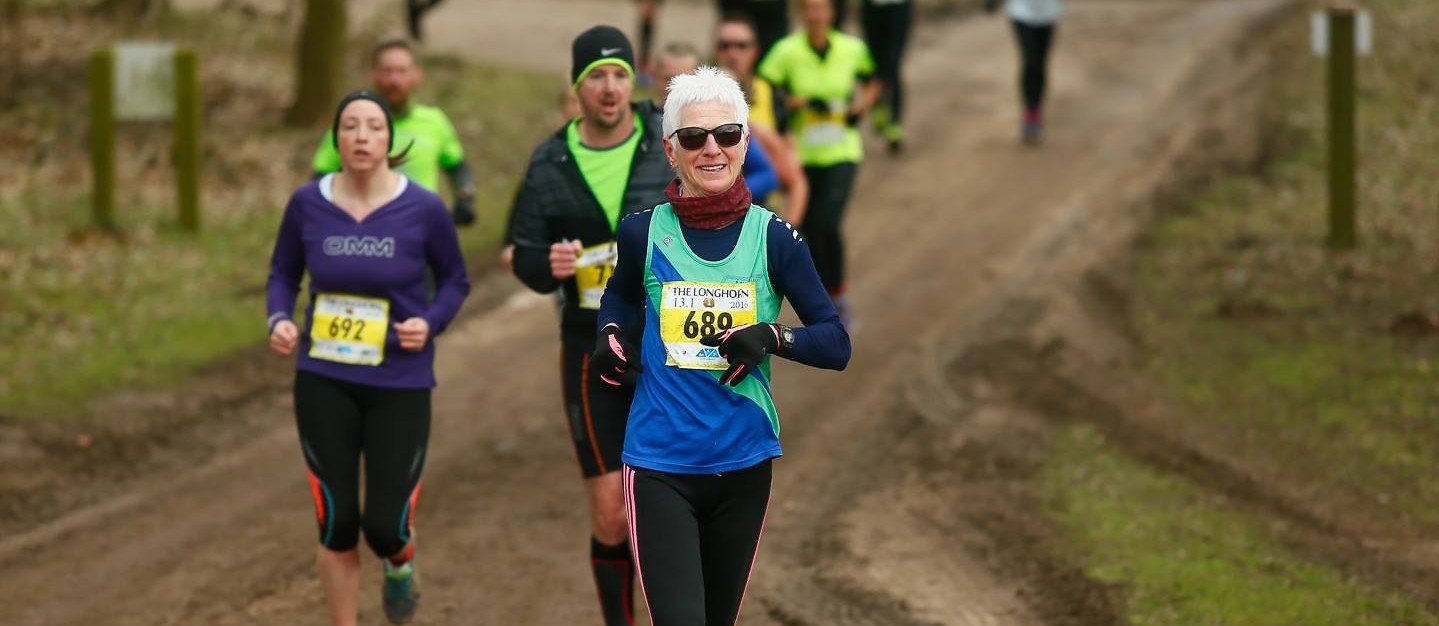
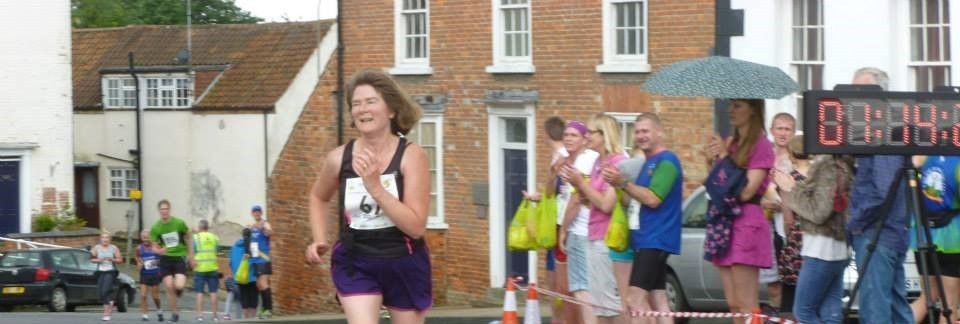


What a lovely interview with my favourite female runner! I first got to know Maddy in the Harriers when she’d returned from breaking her ankle. I’d never heard of her before and wondered why there was so much fuss over someone unknown – I thought! Then I started running with her and this brilliant interview has filled in the background of this lovely lady and remarkable athlete. 🙂
Thank you Keith. I’m glad you enjoyed reading the interview and I agree Maddy is remarkable.